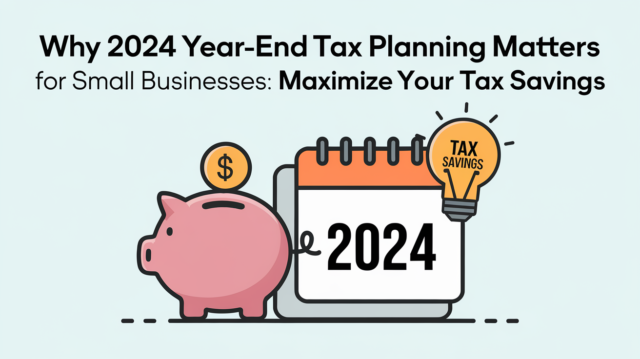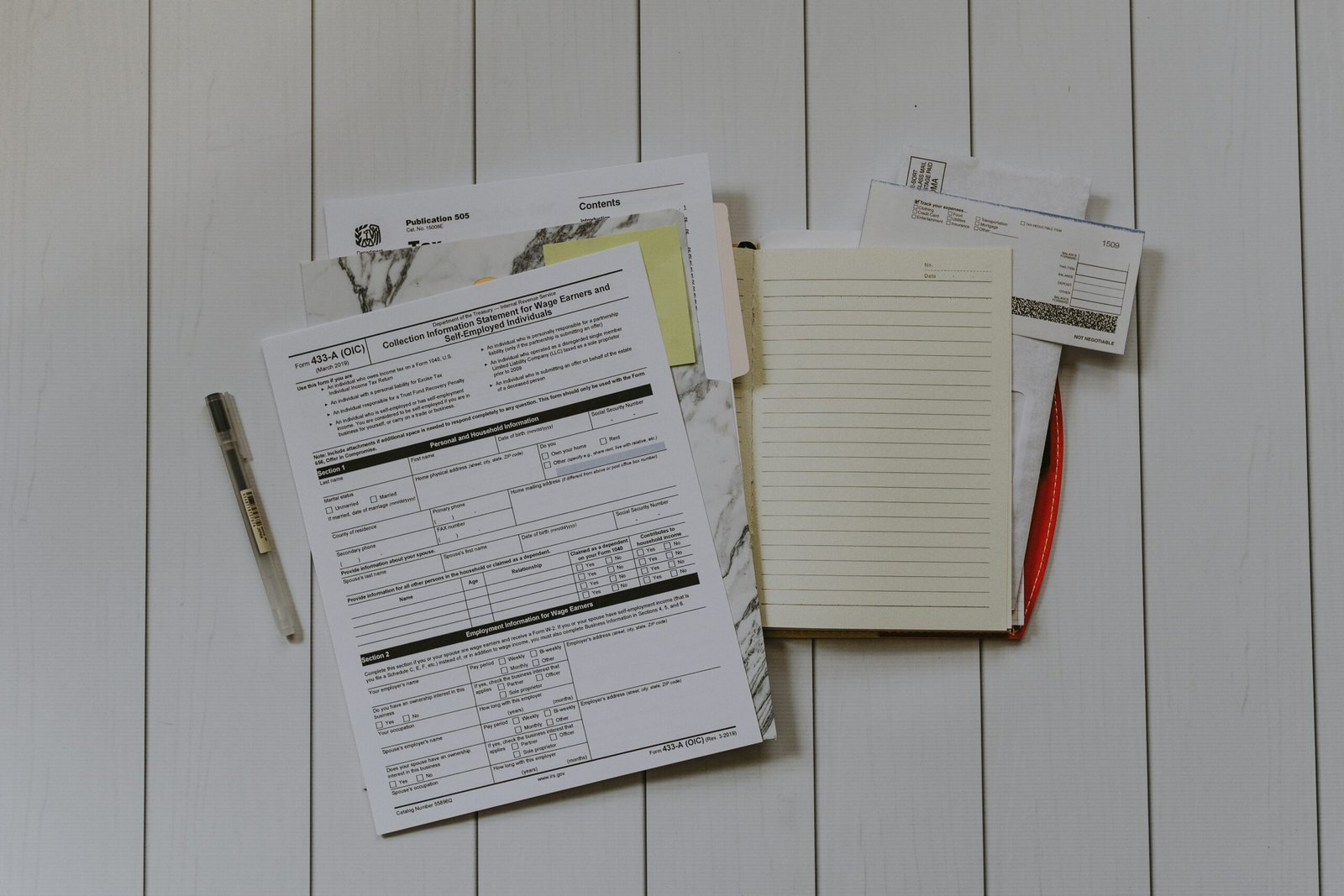
Small business owners can save money and avoid problems during tax season by planning ahead. This guide covers important deadlines, tax-saving strategies, and organization tips for year-end tax planning.
Table of Contents
- 1 Key Tax Deadlines For 2024
- 2 2024 Due Dates
- 3 Additional Important Dates
- 4 2024 Year-End Tax Planning: Tax Deduction Strategies
- 5 Equipment and Vehicle Purchases
- 6 Home Office Deductions
- 7 Employee-Related Deductions
- 8 Professional Services and Business Expenses
- 9 Financial Record Organization
- 10 Essential Records to Gather
- 11 Digital Organization Tips
- 12 Monthly Financial Tasks
- 13 Year-End Review Checklist
- 14 Common Tax Mistakes to Avoid in 2024
- 15 Poor Record Keeping
- 16 Miscalculating Income and Deductions
- 17 Employee Classification Problems
- 18 Preparing for Next Year’s Tax Season
- 19 Getting Professional Help
- 20 2024 Year-End Tax Planning: The Last Word
Key Tax Deadlines For 2024
Small businesses must meet several tax deadlines throughout the year. Here are important dates to remember:
2024 Due Dates
- March 15: Partnership and S-corporation tax returns (Forms 1065 and 1120-S)
- April 15: Individual and sole proprietor tax returns (Form 1040 and Schedule C)
- April 15: First quarter 2024 estimated tax payment
- June 15: Second quarter 2024 estimated tax payment
- September 15: Third quarter 2024 estimated tax payment
Additional Important Dates
- January 31: Businesses must give employees Form W-2 copies for the previous tax year
- January 31: Businesses must file Form 1099-NEC for non-employee compensation paid in the previous tax year
- February 28: Businesses must file information returns (like Forms 1099) for specific payments made during the previous tax year
- March 17: Partnerships and S corporations must file calendar year returns and provide schedules to partners and shareholders
- April 15: Individuals and corporations must file income tax returns and pay taxes due
- September 15: Partnerships and S corporations with extensions must file calendar year returns
- October 15: Individuals and corporations with extensions must file income tax returns and pay any remaining taxes
Note: These dates are based on the IRS draft Publication 509 for 2025. Verify final dates on IRS.gov
2024 Year-End Tax Planning: Tax Deduction Strategies
Small businesses can reduce their taxable income by taking advantage of deductions before December 31. Here are some key strategies:
Equipment and Vehicle Purchases
- Deduct up to $1,160,000 in qualifying equipment purchases under Section 179
- Take 80% bonus depreciation on eligible assets
- Deduct business vehicle expenses using actual costs or the standard rate of 65.5 cents per mile
Home Office Deductions
- Use the simplified method ($5 per square foot, up to 300 square feet) or the regular method to deduct actual expenses
Employee-Related Deductions
- Pay employee bonuses before December 31 to deduct them in the current tax year
- Time payments for employee retirement accounts, health insurance premiums, and other benefits
Professional Services and Business Expenses
- Prepay expenses like professional fees, insurance premiums, marketing costs, and subscriptions
Keep detailed records of all business expenses, including receipts and documentation showing their business purpose
Financial Record Organization
Organizing financial records saves time and reduces stress during tax season. It also helps claim legitimate deductions and prepare for potential audits.
Essential Records to Gather
Create separate digital or physical folders for:
- Income records (sales receipts, invoices, 1099s)
- Expense receipts organized by category
- Bank and credit card statements
- Payroll documents and contractor payments
- Vehicle mileage logs
- Asset purchase records
- Previous tax returns
- Small business loan details
Digital Organization Tips
Use these tools to streamline recordkeeping:
- Bookkeeping software for tracking income and expenses
- Receipt scanning apps to capture and organize receipts automatically
- Mileage tracking apps
- Cloud storage services to back up important documents
- Digital filing systems with clear naming conventions
Monthly Financial Tasks
- Reconcile bank accounts and credit cards
- Review and categorize expenses
- File receipts and invoices immediately
- Back up digital records
- Run basic financial reports like profit and loss statements
Year-End Review Checklist
Before tax season:
- Double-check all transactions are properly recorded
- Ensure you have supporting documents for all deductions
- Create summaries of key business metrics
- Make copies of important documents and store them safely
Common Tax Mistakes to Avoid in 2024
Small business owners can accidentally increase their tax bill or create problems with the IRS through simple oversights. Here are key mistakes to avoid:
Poor Record Keeping
- Missing receipts for business expenses
- Failing to track business vehicle mileage
- Mixing personal and business expenses
- Waiting until tax time to gather records
- Losing receipts or other documentation
Miscalculating Income and Deductions
- Forgetting to include all sources of business income
- Missing valid tax deductions due to poor tracking
- Taking deductions without proper documentation
- Claiming personal expenses as business deductions
- Not understanding which expenses qualify for deductions
Employee Classification Problems
- Misclassifying employees as independent contractors
- Not issuing 1099s to contractors who earned $600 or more
- Missing payroll tax deposit deadlines
- Making mistakes in payroll tax calculations
If you’re unsure about any tax-related decisions, consult a tax professional to avoid problems during an IRS audit
Preparing for Next Year’s Tax Season
To make your business easier and more profitable next year, set up:
- Bookkeeping and accounting software to track income and expenses
- Expense tracking apps to capture receipts on the spot
- Mileage tracking apps if you drive for business
Develop a system that works for you:
- Set aside time each week to check credit card and bank statements
- Enter expenses if you do your own bookkeeping
- Review accounts if you’ve hired someone else to do your bookkeeping
Put these tasks on your calendar and make time to keep up with them
Getting Professional Help
Working with a tax professional can save money, avoid mistakes, and provide peace of mind. Consider professional help if:
- You feel overwhelmed by tax requirements
- Your business has gone through major changes
- You need help with tax planning strategies
- You want to ensure you’re claiming all eligible deductions
- You’ve received notices from the IRS
Look for a professional who:
- Has experience with small businesses in your industry
- Offers year-round tax planning, not just tax preparation
- Communicates clearly and responds promptly
- Has good reviews or recommendations from other business owners
Be ready to discuss:
- Any questions or concerns about your business taxes
- Significant changes in your business
- Your goals for the coming year
While professional tax help is an extra expense, the benefits often outweigh the costs
2024 Year-End Tax Planning: The Last Word
Effective year-end tax planning can save your business money and prevent issues during tax season. By organizing your financial records, maximizing deductions, and avoiding common mistakes, you can reduce your tax liability and make informed business decisions. Consider working with us at CentsIQ to organize your books, gain peace of mind, and maximize your tax savings







